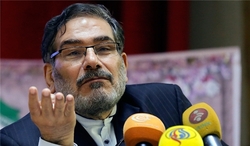 Secretary of Iran's Supreme National Security Council (SNSC) Ali Shamkhani voiced his satisfaction in security maintained for the pilgrims attending the Arabeen rally in Iraq, and said it indicates the Islamic Republic’s competence in dealing with potential threats.
Secretary of Iran's Supreme National Security Council (SNSC) Ali Shamkhani voiced his satisfaction in security maintained for the pilgrims attending the Arabeen rally in Iraq, and said it indicates the Islamic Republic’s competence in dealing with potential threats. RNA - “Millions of pilgrims from Iran and other countries are attending Arbaeen procession with no security problems,” Shamkhani said.
He reiterated that no country can threaten Iran’s security because the country’s Armed Forces are fully prepared to confront any potential threats.
Arbaeen, which is one of the largest religious gatherings in the world, comes 40 days after Ashura, the martyrdom anniversary of Imam Hossein (PBUH).
Each year, millions of people flock to Karbala, where the holy shrine of Imam Hossein (PBUH) is located, to perform mourning rituals. This year, Arbaeen falls on Saturday, October 19.
Last year, millions of Muslims from across the world, including Iran, attended the 100-km rally from Iraqi city of Najaf to Karbala where the holy shrine of Imam Hossein (PBUH) is located.
Observers believe the rally is unique in terms of quality and also the number of its participants. It starts from the holy shrine of Imam Ali (PBUH) - the first Shiite Imam - and ends up in the holy shrine of Imam Hossein (PBUH).
Imam Hossein (PBUH) was martyred in the 680 A.D. battle fought on the plains outside Karbala, a city in modern Iraq that's home to the Imam's holy shrine.
In the battle, Imam Hossein (PBUH) was decapitated and his body mutilated by Yazid's armies. All of Imam Hossein's male family members, relatives, friends, soldiers who all together formed a 72-member army were beheaded in an unequal war with a 30,000-strong army of the enemy in the desert of Karbala.
The occasion is the source of an enduring moral lesson for the Shiites.
Imam Hossein's martyrdom - recounted through a rich body of prose, poetry and song - remains an inspirational example of sacrifice to Shiites, who make up a majority of the Muslim population in Iran, Pakistan, Iraq and Bahrain.
847/940